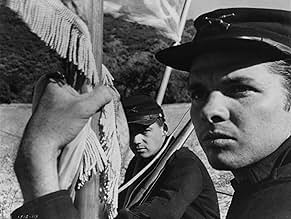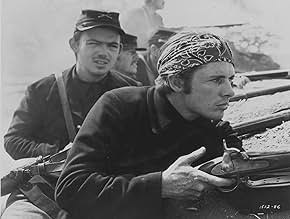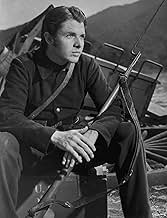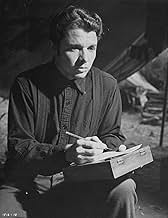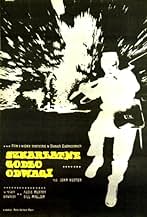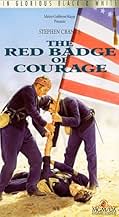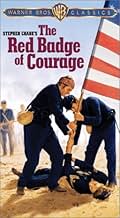IMDb RATING
7.1/10
5.2K
YOUR RATING
Truncated adaptation of Stephen Crane's novel about a Civil War Union soldier who stuggles to find the courage to fight in the heat of battle.Truncated adaptation of Stephen Crane's novel about a Civil War Union soldier who stuggles to find the courage to fight in the heat of battle.Truncated adaptation of Stephen Crane's novel about a Civil War Union soldier who stuggles to find the courage to fight in the heat of battle.
- Director
- Writers
- Stars
- Nominated for 1 BAFTA Award
- 2 wins & 1 nomination total
Robert Easton
- Thompson
- (as Robert Easton Burke)
Don Anderson
- Soldier
- (uncredited)
Smith Ballew
- Union Captain
- (uncredited)
Albert Band
- Union Soldier Fording River
- (uncredited)
Gregg Barton
- Soldier
- (uncredited)
Whit Bissell
- Wounded Officer
- (uncredited)
Robert Board
- Soldier
- (uncredited)
Chet Brandenburg
- Wounded Soldier
- (uncredited)
Edwin Breen
- Confederate Flag Bearer
- (uncredited)
Joe Brown Jr.
- Soldier
- (uncredited)
- Director
- Writers
- All cast & crew
- Production, box office & more at IMDbPro
Featured reviews
Those who think Audie Murphy was not a very good actor haven't seen him in this film. Perhaps some of his later Western films didn't give him as much to work with, but in Red Badge of Courage he shines. Just a few of many great scenes which come to mind: early in the film when he hears that his group will finally be going into action, he writes a letter to his pa 'in case you are told that I have fallen', and you can see the remains of tears drying on his face; later on when his friend Jim dies after the first real battle, in Murphy's reaction you can see how wrenching it is for him to realize the human cost of war. Bill Mauldin, the famous cartoonist, plays the role of Murphy's closest friend in his fighting group, and does a superb job as well. Both Murphy and Mauldin seem perfectly suited to the age of their characters. While they were not originally actors by trade and had little if any acting experience, their performances in this film should shame many of today's 'actors' who draw multi million dollar paychecks and whose 'work' pales in comparison to that of Murphy and Mauldin in this film.
My only real disappointment was that due to massive editing the film is only 69 minutes long! I figured it was at the midway point when 'the end' came on the screen. Apparently this film became a sort of political football within the studio when it was made, yet I can't understand how anyone could justify cutting it down to this length. I was thoroughly enjoying this film all the way through and was nowhere near ready for it to end. Even so, even if you're not a Civil War buff, this is an excellent film with very engaging performances. It's more about the people than it is the war. Highly recommended.
My only real disappointment was that due to massive editing the film is only 69 minutes long! I figured it was at the midway point when 'the end' came on the screen. Apparently this film became a sort of political football within the studio when it was made, yet I can't understand how anyone could justify cutting it down to this length. I was thoroughly enjoying this film all the way through and was nowhere near ready for it to end. Even so, even if you're not a Civil War buff, this is an excellent film with very engaging performances. It's more about the people than it is the war. Highly recommended.
Deserves more credit than it currently receives. The directing alone is awesome, with the number of unique and different shots that Huston came up with really takes this Pic away from the norm.
Some of the realism in the portrayals that would be lost on some American viewers include the scene where the General talks to the troops before the battle, asking them what they are going to eat for dinner. He goes from group to group asking the same questions - why? Remember (duh), no radios, no public address system. Commanders had to spread their message by repeating it over and over - inspiring a different group each time.
A very enjoyable 69 minutes. Sad that the studio had to meddle with the original cut (what else is new?).
F
Some of the realism in the portrayals that would be lost on some American viewers include the scene where the General talks to the troops before the battle, asking them what they are going to eat for dinner. He goes from group to group asking the same questions - why? Remember (duh), no radios, no public address system. Commanders had to spread their message by repeating it over and over - inspiring a different group each time.
A very enjoyable 69 minutes. Sad that the studio had to meddle with the original cut (what else is new?).
F
Keep in mind that many people involved with this film were WW2 vets. That's important, as I think it made a HUGE difference in how the film came out. Audie Murphy was the most decorated American soldier of WW2. Bill Mauldin wasn't a line soldier, but he'd been in the infantry before the war. He knew what the daily life of a grunt was all about. And director John Huston had directed films in WW2, standing at the front lines in Italy to do so. They all knew what war should look like. Had these people not been involved, I think this movie wouldn't have rung true as it did then and does today. Sure, the weapons, most of the uniforms and equipment are horribly wrong (this was in the days when a "trapdoor" Springfield rifle and Indian War era equipment was just fine for a Civil War film), but this film must be viewed on it's acting and photography. They got it across what it was like to be SHOT at, and how it felt to be terrified in battle, better than any film since, "All Quiet of the Western Front." Yes, it's seriously abridged and condensed (quite a feat when you consider how short the book is), but it gets the spirit across just fine. It's not perfect by any measure, but you'll never be able to get such a group together to re-make this film and have ring as trued as this classic.
The original cut of THE RED BADGE OF COURAGE has never been seen--and probably does not exist--but this is the truncated version of the John Huston film and it's still powerful stuff.
It's an examination of courage among men under intense fire--such as the infantry men in the Civil War, about whom writer Stephen Crane wrote with almost poetical finesse. So that some of Crane's writing is maintained on screen, we get a narration by James Whitmore that succeeds in helping us understand the central character (AUDIE MURPHY) and his motivations.
Judging from photographs of the Civil War, the film has a gritty, realistic look as it goes from battle to battle with a group of men we get to know and recognize as vulnerable human beings caught in the tragedy of impossible battle situations.
AUDIE MURPHY is not noted for being an actor capable of deep characterization, but he's been guided by Huston to give a very effective, deeply felt performance, no doubt helped by the fact that he's been in the midst of battle before (he's a real life war hero), and must know the inner conflicts that face any man in battle.
The supporting cast of actors are fine, especially BILL MAULDIN as Audie's friend, both of them confessing moments of cowardice during battle fatigue and then able to go on with their mission.
But the real credit has to go to John Huston for writing and directing a film that he was never especially proud of, but which is stunningly photographed and directed with great skill.
It's an examination of courage among men under intense fire--such as the infantry men in the Civil War, about whom writer Stephen Crane wrote with almost poetical finesse. So that some of Crane's writing is maintained on screen, we get a narration by James Whitmore that succeeds in helping us understand the central character (AUDIE MURPHY) and his motivations.
Judging from photographs of the Civil War, the film has a gritty, realistic look as it goes from battle to battle with a group of men we get to know and recognize as vulnerable human beings caught in the tragedy of impossible battle situations.
AUDIE MURPHY is not noted for being an actor capable of deep characterization, but he's been guided by Huston to give a very effective, deeply felt performance, no doubt helped by the fact that he's been in the midst of battle before (he's a real life war hero), and must know the inner conflicts that face any man in battle.
The supporting cast of actors are fine, especially BILL MAULDIN as Audie's friend, both of them confessing moments of cowardice during battle fatigue and then able to go on with their mission.
But the real credit has to go to John Huston for writing and directing a film that he was never especially proud of, but which is stunningly photographed and directed with great skill.
Although John Huston's The Red Badge of Courage has stood the test of time critically, back then it lost lots of money in its first release. The film was a bone of contention between Louis B. Mayer and Dore Schary who were locked in a power struggle for control at Metro-Goldwyn- Mayer. Schary wanted to make the film, Mayer said it would flop and he was proved right. He also got ousted anyway.
The Red Badge of Courage refers to the blood that gets spilled should you sustain a battle wound. If you remember in Oliver Stone's Platoon, the men don't treat new arrival Charlie Sheen until he's gotten one of those. Here the Red Badge is something to be avoided if possible.
By a piece of serendipity when Audie Murphy returned from World War II and was deciding on a career, he chose the movies. He certainly was loaded down with offers, but I guess he sensed in himself an inner gift for being an actor. Not Marlon Brando or Laurence Olivier, but someone in the hands of the right director could get a good performance out of him. In John Huston he found that director, twice in fact as he later worked with him in The Unforgiven.
There was no need for research because our most decorated soldier in history lived the research in North Africa and Europe. There's a dimension to Audie's performance and that of GI cartoonist Willard Mullin that no training at the Actor's Studio could have given them. Murphy just summoned his memories of what it was like to be a kid from Texas whisked off to Europe the way young Henry Fleming is facing the Confederates in their backyard.
Murphy gets good support from an able cast of people like Arthur Hunnicutt, Royal Dano, John Dierkes, and Andy Devine as various other soldiers in the Union Army, all citizens serving their country. No career people in this crowd. Also James Whitmore, reading the narrative of Stephen Crane's novel serves almost like another cast member and moves the film's story line along.
Though it lost money for MGM, The Red Badge of Courage is still a fine film with some great insights into the meaning of battlefield bravery.
The Red Badge of Courage refers to the blood that gets spilled should you sustain a battle wound. If you remember in Oliver Stone's Platoon, the men don't treat new arrival Charlie Sheen until he's gotten one of those. Here the Red Badge is something to be avoided if possible.
By a piece of serendipity when Audie Murphy returned from World War II and was deciding on a career, he chose the movies. He certainly was loaded down with offers, but I guess he sensed in himself an inner gift for being an actor. Not Marlon Brando or Laurence Olivier, but someone in the hands of the right director could get a good performance out of him. In John Huston he found that director, twice in fact as he later worked with him in The Unforgiven.
There was no need for research because our most decorated soldier in history lived the research in North Africa and Europe. There's a dimension to Audie's performance and that of GI cartoonist Willard Mullin that no training at the Actor's Studio could have given them. Murphy just summoned his memories of what it was like to be a kid from Texas whisked off to Europe the way young Henry Fleming is facing the Confederates in their backyard.
Murphy gets good support from an able cast of people like Arthur Hunnicutt, Royal Dano, John Dierkes, and Andy Devine as various other soldiers in the Union Army, all citizens serving their country. No career people in this crowd. Also James Whitmore, reading the narrative of Stephen Crane's novel serves almost like another cast member and moves the film's story line along.
Though it lost money for MGM, The Red Badge of Courage is still a fine film with some great insights into the meaning of battlefield bravery.
Did you know
- TriviaAfter seeing what MGM had done to the film, John Huston instructed his agent to include a clause in all future contracts guaranteeing that he would receive a copy of his director's cut on all of his films.
- GoofsBeginning at 14:28, several Union soldiers wading across the waist-deep river and later climbing out of the river are carrying the U.S. Rifle Model 1903, also known as the Springfield Model 1903. Note especially the soldier who climbs out of the river holding his rifle above his head. The Model 1903 is a bolt-action, magazine-fed rifle that was adopted by the US Army in 1903 and used in World Wars I and II, but not the American Civil War which was fought from 1861-1865.
- Quotes
The General: Howdy Jim, Corporal. How are those wounds?
Soldier: Stinging some, General, but they're a-mending.
The General: That's fine, fine. Anybody care for a chaw?
- ConnectionsEdited into Hollywood: The Dream Factory (1972)
- How long is The Red Badge of Courage?Powered by Alexa
Details
Box office
- Budget
- $1,640,000 (estimated)
- Runtime
- 1h 9m(69 min)
- Color
- Aspect ratio
- 1.37 : 1
Contribute to this page
Suggest an edit or add missing content


